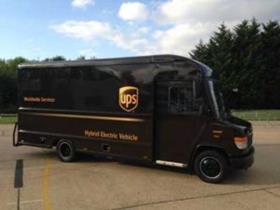UPS director of sustainability for Europe, Peter Harris, shares some of the work taking place across European cities ahead of his appearance at Freight in the City Spring Summit next month.
Global parcel carrier UPS is to trial a brand-new urban delivery concept in London this year.
The company plans to operate new electrically-assisted cargo containers in London’s busy Westminster area, in an effort to reduce the emissions and congestion associated with increasing van usage in the capital.
Technology used on the ‘e-trailer’ is termed net neutral, so the weight of the trailer is not felt by the handler, allowing for increased volumes of last-mile deliveries by foot or cycling.
The trailer is being developed through the Low Impact City Logistics project, which is part of a £10m research investment by InnovateUK for collaborative R&D to improve end-to-end people and freight journeys.
It is planned that a number of the e-trailers would be preloaded at the UPS centre in Camden before being brought in on a larger trailer towed behind a normal delivery vehicle for helpers to then make the final mile by foot or cycle.

Peter Harris (pictured), director of sustainability for Europe at UPS, tells Freight in the City that the concept for the trailers was a natural extension to an urban delivery operation that has been running in Hamburg, Germany for a number of years.
This sees a number of urban micro depots - large containers, much like the size used for sea freight - positioned around the city.
The containers hold enough volume for several helpers to work from throughout the day, delivering parcels by foot, bike or e-trike.
The helpers also collect parcels from residents and businesses in the city centre and return them to the containers for pick-up at the end of the day by one lorry.
“So, instead of it being trucks moving around in the city all day, it's one truck in and one truck out, and the rest of the time we’re using zero-truck transport, which is the ambition to try and get trucks out of the city and the emissions and congestion that go with them,” explains Harris.
The Hamburg model is now being expanded to other European cities.
Mega city
“But when we came to thinking about London, we thought we probably need a slightly different approach here,” says Harris.
One of the key challenges was London’s density, he says, as a mega city, with the option of siting a number of large containers on valuable road or pavement space being unlikely.
Also, the option to deliver by trike might prove tricky in London’s bustling streets, making foot delivery with an e-trailer a more practical proposition.
To overcome all these challenges, UPS is working within a consortium including the University of Huddersfield, Westminster City Council, Fernhay, Skotkonung and Outspoken Delivery to develop the e-trailer technology and prototype.
“At our central London depot in Camden, the e-trailers will be positioned on the belt just as our normal trucks are” says Harris.
“The trailers will then go down-town already loaded into drop order.”
To avoid the need to drop-off large container units across the city, e-trailers will be delivered by a transfer trailer pulled by a regular distribution truck. This will likely hold around six units, although this has not yet been finalised.
Timescale for rollout of the e-trailers has yet to be confirmed, but will take place this year.
Urban focus
The project is just one element of the move towards sustainable deliveries taking place in the UK by UPS.
For example, the company has just deployed its 52nd electric truck in London
“They're mostly conversions from diesel, which is quite interesting in its own right because a version of the style and configuration that we wanted didn't exist, so we developed our own working with a German technology firm called EFA-S,” says Harris.
UPS carries out the strip-down and refurbishment of the older trucks used itself ahead of the electric conversion by EFA-S.
The company has received funding through its work on the FREVUE project that aims to establish the feasibility of electric commercial vehicles in real-life operations across Europe.
Project work has included significant expenditure to overcome the challenges of charging multiple electric vehicles from the grid at one time.
“We actually went through a major expenditure in London to achieve this. We don't want to do this again as it's very expensive and it's not moveable. Nor is it incremental.
“So what we're proposing instead is a smart grid facility that would connect our vehicles to the grid in an intelligent way and look for available capacity within the existing supply,” Harris says.
“If we can make that work, and we are hoping to do it in conjunction with UK Power Networks Services, then it could potentially open up a completely new realm of opportunity for urban electrification.”
Range-extended
The company is also planning to introduce 15 more range-extended electric 7.5-tonne Tevva Motors trucks into its fleet (pictured).

And gas-powered trucks are also a key player in the UPS alternative-fuelled fleet, with the company operating 19 HGVs on LNG from its Tamworth depot.
“The challenge is that we want to run them on renewable gas, but it's just not available in liquid form. So we've had to fall back on LNG” says Harris.
“There needs to be new infrastructure put in place to capitalise on this new market.”
Harris believes the UK is well placed to be a leader in terms of renewable fuels expertise, with a political framework supportive of driving such developments forward.
As such, the UK continues to be a pivotal market for UPS to trial new emerging technologies and developments.
- Peter Harris will be speaking about the projects UPS has trialled across European cities at Freight in the City Birmingham on 1 March. More than 350 visitors have already registered to attend this free event focusing on improving last-mile logistics. Secure your place today.













